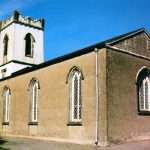Sermon for the Second Sunday in Lent, 16th March 2014
“You must be born again”. John 3:7
John 3:7 has a bad press. Saying the words, ‘you must be born again’ to most Anglican congregations stirs up negative thoughts because we straightaway think we are being got at, that someone is standing in judgement over us, that someone is saying to us that they are Christians and we are not.
But, if it is a verse that we see in a negative way, what then do we do with this Gospel reading? I know what we usually do, we usually skim over it. We usually forget about these verses and go on to something a bit more comfortable. Given this morning’s readings, most Church of Ireland clergy will tend to be drawn towards Abraham rather than to this conversation of Jesus with Nicodemus.
If we take Jesus seriously, we can’t just skip over the bits that present us with difficulties. We need to look again at this encounter between Jesus and Nicodemus.
“Now there was a man of the Pharisees named Nicodemus, a member of the Jewish ruling council”; it is Nicodemus in this story who is from a rather humourless group of people. The Pharisees were so humourless that they had hundreds of rules that were to be observed every day and took the breach of any of them very seriously. The Pharisees thought they could earn their place with God through their “good-living”. If we hear someone is “good-living”, we tend to think of them as very religious, as dour, narrow and humourless; as people with a very strong belief in judgement and not much sense of grace.
It is the “good-living” Pharisee, Nicodemus, who is told that he must be born again. Nicodemus, who is a legalist, misunderstands what Jesus is saying to him. “How can a man be born when he is old?” Nicodemus asked. “Surely he cannot enter a second time into his mother’s womb to be born!”
Jesus makes it clear what he means: “I tell you the truth, no one can enter the kingdom of God unless he is born of water and the Spirit. Flesh gives birth to flesh, but the Spirit gives birth to spirit. You should not be surprised at my saying, ‘You must be born again.’”
Even then Nicodemus still does not understand , “How can this be?” he asks, and Jesus’ response to him is clearly one of frustration.
“You must be born again” is a word of advice, a word of warning to anyone who wants to follow Jesus, that we have to become new people. We think that we can shape God into our own preferences, our own way of doing things, we think that we can fit God into our lives where he is convenient.
No, no, no, Jesus is saying. Don’t think you can make God in your own image, you’ve got it the wrong way round. It’s you that has to be remade. It’s you that has to be born again.
God will not fit into our human way of thinking, our human way of doing things. Jesus tells Nicodemus, “The wind blows wherever it pleases. You hear its sound, but you cannot tell where it comes from or where it is going. So it is with everyone born of the Spirit.”
Perhaps when we hear ‘You must be born again’, we become defensive because of the thoughts it stirs up in our memories, but perhaps we also recoil because we don’t want to change. Sometimes it is easier to shift our feelings elsewhere—to say I don’t like that Bible verse because it misused is easier than admitting that I don’t like that Bible verse because it is too challenging.
Let’s be serious in our thinking. If we think sufficiently of our faith that we are prepared to put time and money into it week by week, then it is clear that we take God seriously, and if we take God seriously let’s take what he is saying to us seriously. Let’s ask ourselves if we really have become new people through what we believe.
We have to ask ourselves, “am I a new person?” When Jesus says, “I tell you the truth, no one can see the kingdom of God unless he is born again”, how do we answer him?


Comments
Sermon for the Second Sunday in Lent, 16th March 2014 — No Comments
HTML tags allowed in your comment: <a href="" title=""> <abbr title=""> <acronym title=""> <b> <blockquote cite=""> <cite> <code> <del datetime=""> <em> <i> <q cite=""> <s> <strike> <strong>